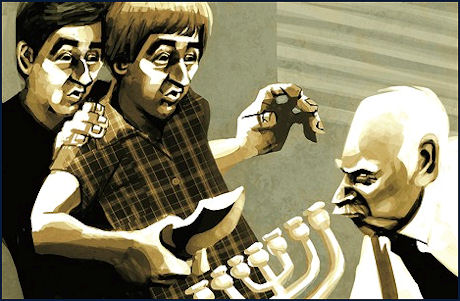To begin his New Yorker review of Leaves of Grass, David Denby has written a diagnosis of what he believes has been wrong with the choices made star-producer Edward Norton. Not a question of talent but judgment, he’s saying. And yet he’s basically saying “move it or lose it.”

“Edward Norton is a good actor and a busy man — a citizen who concerns himself with solar energy, affordable housing, the Maasai wilderness, peace in the Middle East, the High Line, the fate of the Mets’ outfield, and heaven knows what else,” he writes. “But he’s not quite a movie star, or the actor he could be.
“Early on, after a fast, Oscar-nominated start as an altar boy accused of murdering a priest in Primal Fear (1996), Norton played cunning lowlifes in tough little pictures. He was brilliant as Lester (Worm) Murphy, a reckless gambler and nihilist, in Rounders (1998), and then, muscling up, he turned Derek Vinyard, the swastikaed skinhead in American History X (also 1998), into a horrifyingly intelligent native fascist.
“Norton has blue eyes, a long, narrow chin, and an ironic smile that can suddenly turn intimate. He can be retiring and nearly bodiless, falling back from confrontation like a ghost; he can also be menacing and cold, hardening his baritone into a snarl. Like James Woods in films thirty years ago, he appears to think that he’s the smartest person in the room, and, like Woods, he uses that arrogance as a way of exposing the madness of egotistical characters.
“At the moment, movies could use more men like Norton — actors who can spread a little acid or a little light. If such high-domed performers develop an ingratiating way with women, they become stars, like George Clooney; if not, they usually subside into character roles, like Woods or Alec Baldwin. It’s not easy to be the smartest guy in the room.
“Norton, I think, has the charm, the courage, and the dimensions to take on great parts, but his career has wandered around in roles that have been off center without being good. He stood up to Brad Pitt‘s bullying in the nutty cult classic Fight Club (1999). He was the scientist with anger-management issues in The Incredible Hulk (2008), the kind of popping-veins extravaganza every actor should gratefully leave to Jim Carrey.
“Norton was then swanky in cravats, high collars, and an Anglo-Austrian accent in that thick wedge of Hapsburg cheesecake The Illusionist (2006). The accent got even more pinched and refined when he played a British doctor suppressing his personal sorrows and martyring himself to Chinese epidemics in The Painted Veil (2006), a frightfully noble picture that could have been made by MGM in 1940.
“These are not the best choices for an actor with an instinct for contemporary life. Action is apparently not to Norton’s taste, but he’s a natural for calculating power types and intellectuals — gangsters, lawyers, politicians, journalists, corporate and financial operators. He needs to find writers who will create roles for him as intelligent, troubled men, as Clooney has.”









